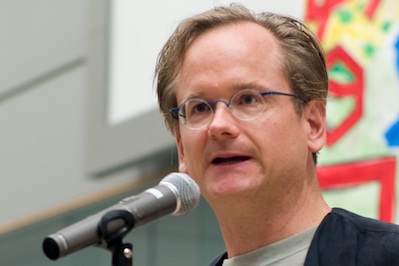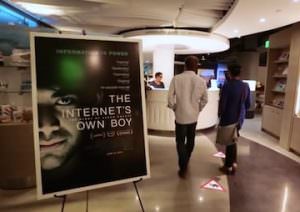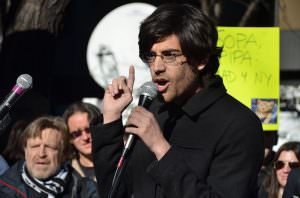Truthdigger of the Week: Lawrence Lessig
With his Mayday PAC, the Harvard legal scholar and civil libertarian has emerged as the chief executor of Aaron Swartz's vision of a free, creative and open America in the digital age. Lawrence Lessig. Photo by Joi (CC BY 2.0)
Lawrence Lessig. Photo by Joi (CC BY 2.0)
Nov. 8 was Aaron Swartz Day — a time to honor the late champion of civil rights in the Internet age who killed himself early last year amid a federal prosecution for downloading troves of digital material held by the academic library company JSTOR. It was a day his surviving allies and admirers enlisted in an effort to form Swartz’s still-evolving legacy into a hammer that can be used to smash a state controlled by an elite whose power derives from the closing up of information and build a society premised on political openness and the free exchange of ideas.
It’s a beautiful, urgent vision. And fortunately for Swartz and the rest of us, it has another champion in Swartz’s close friend, comrade and teacher, Lawrence Lessig.
Lessig is the campaigning civil libertarian, Harvard professor and legal scholar who emerged in the fallout of Swartz’s death as chief executor of his vision. Having met Swartz when Swartz was a budding computer prodigy over a decade ago, Lessig was instrumental in shaping his young friend’s character and sense of political purpose. But reading Lessig’s statements in the days that followed, his friends became aware of another dimension of Lessig’s virtue: He allowed himself to be shaped in turn by his young friend.
The tender egalitarianism of their relationship was evident again in a Truthdig article marking Aaron Swartz Day. Spotlighting the Mayday political action committee — the culmination, so far, of Lessig’s activist efforts — Lessig told Truthdig contributor Thor Benson that the young Swartz inspired a radical reorientation of his political objectives. A lawyer, Lessig spent a significant portion of his professional life focused on copyright, trademark and then digital access issues. Swartz persuaded him to focus on getting the corrupting influence of money out of politics.
“When Aaron convinced me to take up the cause of corruption, he was like, ‘Why do you believe you’re ever going to make any progress on the missions that you’re working on before we end the problem of corruption in Washington?’ That was the reason I took on that project,” Lessig said. “When he died, I decided I wanted to make the movement more urgent.”
So Lessig started the Mayday PAC in May, almost a year and a half after his friend’s death. A “crowdfunded SuperPAC to end all SuperPACs … including this one,” the group is focused on reducing “the influence of money in politics by electing a Congress committed to fundamental reform by 2016.” It’s an audacious objective, one that no doubt would prompt derisive laughter in many in the wake of the massive Republican domination of the 2014 midterm election, an event in which the freedom-strangling party recovered a hold on both congressional houses it lost just seven years before. And it’s true, just two of Mayday’s eight sponsored candidates won their races. But as an early leader of the French Revolution — an uprising that, however fraught its course, Americans helped inspire — once said, “We need audacity, and yet more audacity, and always audacity!”
In keeping with Aaron Swartz Day, a new documentary telling the story of his life, “The Internet’s Own Boy,” was shown in San Francisco. Lessig features large in the film, and Truthdig contacted its maker, Brian Knappenberger, moments before he fielded questions from the audience. “Lessig’s focus on technology and its relationship to our civil liberties has made him one of the most prescient activists and voices of our moment,” as has his fight “against the corroding influence of money in politics,” Knappenberger said. If Americans fail to overcome the dominance of elites who impound knowledge, and by extension, democracy, it won’t be because Lessig didn’t try. For his past, present and anticipated future efforts, he is our Truthdigger of the Week.
Your support matters…Independent journalism is under threat and overshadowed by heavily funded mainstream media.
You can help level the playing field. Become a member.
Your tax-deductible contribution keeps us digging beneath the headlines to give you thought-provoking, investigative reporting and analysis that unearths what's really happening- without compromise.
Give today to support our courageous, independent journalists.




You need to be a supporter to comment.
There are currently no responses to this article.
Be the first to respond.